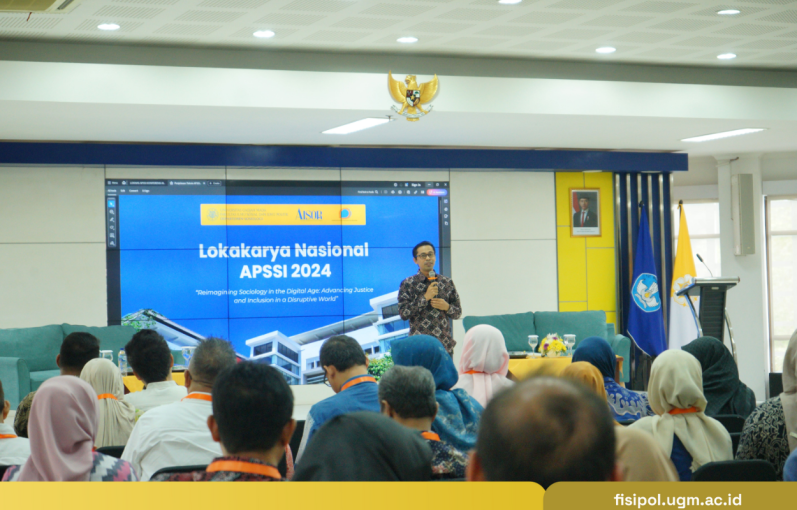
Yogyakarta, November 15th 2024─Department of Sociology, Faculty of Social and Political Sciences of UGM and the Association of Indonesian Sociology Study Programs (APSSI) held a National Workshop on Thursday (14/11). The workshop invited academics from sociology study programs across Indonesian universities to discuss the design of academic development in facing global challenges.
With the theme “Reimagining Sociology in the Digital Age: Advancing Justice and Inclusion in a Disruptive World”, the National Workshop focused on formulating a curriculum responsive to future changes. Delivered by the Dean of Faculty of Social and Political Sciences UGM, Wawan Mas’udi, S.IP., MPA, Ph.D., it is important for the academic sector to further elaborate global issues in order to be able to answer the social problems of society. “Socio-political science is facing a lot of challenges. How these issues have implications for society and power. I think this is important for us to discuss,” he explained.
Wawan pointed out the issue of digitalization, which is intended to provide opportunities and equality for the community, but instead creates new gaps. There are issues of power relations between the community and the elite. The hope is that academics will be able to develop a curriculum that is inclusive and dynamic with technological developments.
“How can we answer the challenges by reflecting and returning to our root. We hope that the APSSI workshop can produce an agreement on what aspects of substance must be present in all sociology study program curricula,” added Wawan. He hopes that there will be an innovative curriculum program that can be managed together in a consortium with a similar mindset.
Sociology plays an important role in understanding the context of diversity and inclusiveness in all issues. The National Workshop provides an opportunity and a platform for sociology academics to take part in answering future questions by prioritizing these two aspects. The Chairperson of the Association for Indonesia’s Sociology of Religion (AISOR), a community that accommodates the interest in the study of sociology of religion in Indonesia, explained the importance of sociologists accommodating national development.
“This is a series that we hope can be the development of the sociology curriculum in the future to answer challenges. Our society is already very active in digitalization. But does that mean they are ready?” he said. This discussion will ultimately answer these questions, as well as formulate solutions to the readiness of society to face the growing digitalization.
In line with that, the Vice Rector for Student Affairs, Community Service, and Alumni, Dr. Arie Sujito, S.Sos., M.Si. also responded with the urgency of collaborative roles of academics. According to him, campuses should not need to compete, but rather collaborate. Forums like APSSI are intended to enable the academic sector to process together and answer global challenges. He also highlighted how current issues are heavily influenced by the degradation of democracy.
“We know that our democracy is experiencing degradation. We know that contesting is sometimes not easy. The curriculum is good in the classroom, but what is the benefit to the environment? We can’t be silent when we see our surroundings are not okay,” Arie concluded.
The National Workshop was held in conjunction with two other forums, namely the Biennial Conference by the Association for Indonesia’s Sociology of Religion (AISOR) and the Sociologist Gathering themed Sowan and Ngisis Sociology. In addition to facilitating discussion sessions and knowledge sharing, this event is a place for academics to build connections and pioneer collaborations between sociologists and other disciplines. Collaboration is also intended as a form of contribution from the Faculty of Social and Political Sciences of UGM in building the 17th Sustainable Development Goals (SDGs), namely Partnerships to Achieve Goals.
